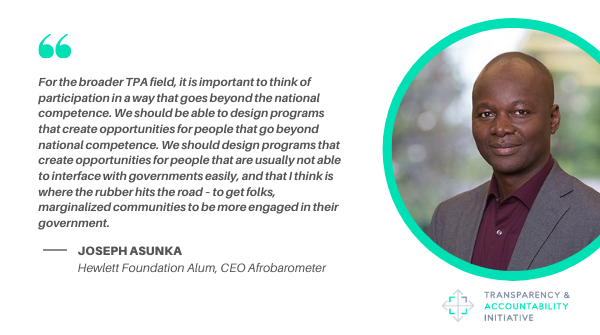Highlights
- A bright new world?
- Data (em)powered
- Digital cat and mouse
- Aftershocks
- Algorithmic grantmaking?
- TAI Spotlight: Accountability to affected populations in times of the pandemic
A bright new world?

Image Credit: Crosswalk
While the pandemic still rages, thoughts nonetheless shift to how we truly #buildbackbetter once the virus is controlled. Maeve Cohen argues that if we want a future of gender, racial, and intergenerational equality – we need a new social guarantee for all based on people’s needs, not their ability to pay. Other experts argue that we need to “double mainstream” gender and climate in public finance (and can apply lessons from gender responsive budgeting to apply on climate responsive budgeting.)
Find further inspiration in this Institute of Development Studies (IDS) bulletin on governance interventions to help create conditions for building effective and inclusive institutions.
Any post-COVID reset will rely on being more attuned to local needs and those “left behind.” To that end, Tarisai Jangara suggests reframing the narrative re what it means to be “community-led.” There is no shortcut around taking the time to really listen to the views of the community. There also is no avoiding an understanding of power dynamics if pushing for lasting change. John Gaventa writes on where we are in understanding power as the basis for activism.
Can dialogue foster real change? The European Endowment for Democracy invited experts from North Africa to discuss possible scenarios for real change and how think tanks and civil society can influence decision-makers in the region. For inspiring stories of pro-democracy activists, check out their interactive annual report.
Want to better understand the societal fallout of the pandemic? Lena Walther, Jannes Jacobsen, and Lukas M. Fuchs share an emotion-centered survey instrument with applications to the analysis of marginalization, unemployment, gentrification, migration, and the COVID impact on social disintegration and isolation.
Data (em)powered

Image Credit: Pollicy
Last week we discussed the role of data for better lives. Certainly, the pandemic has highlighted the importance of trustworthy data for governments, businesses, and civil society to respond effectively. So, interesting to see the World Bank’s new Statistical Performance Indicators to assess if fast-evolving national data systems are meeting the challenge.
Afrofeminist Data Futures reports on how feminist movements in sub-Saharan Africa can be empowered through the production, sharing and use of gender data by mapping over 140 feminist organizations across sub-Saharan Africa. Meanwhile, Publish What You Fund point to the need for more transparency of funding for gender equality if we are to know if donors’ gender financing is making a difference.
TPA Full Disclosure: Joseph Asunka on shaping the politics around governance service delivery

All his life, Joseph Asunka has cared about getting government to be more attentive and responsive to citizens. The reason is close to home. Growing up in rural Ghana, he never experienced governance. “It felt like there was no way you could engage directly with government officials in ways that allow you to ask for services within your community,” he recalls. We spoke as Joseph wrapped up his tenure as Program Officer at the Global Development Program of the William and Flora Hewlett Foundation (and a steering committee member of TAI) and takes on the exciting role of Chief Executive Officer at Afrobarometer. He talks of his motivations to work on TPA issues and the need to design programs that will continue to influence politicians and governments to do the right thing.
Digital cat and mouse
Mary Fitzgerald and Cori Crider detail a victory for openDemocracy and Foxglove (a TAI member grantee) on their battle against the British government National Health Service (NHS) data deals with the spy tech firm Palantir. A win for transparency and vigilance over deals involving people’s health data.
Of course, the bigger picture is still a scary one. Tony Roberts edits a study comparing digital rights landscapes of ten African countries over the past twenty years and finds that “each new generation of digital technology used by activists to enable free expression is met by a barrage of government measures designed precisely to shut down those freedoms and deny citizens their digital rights”.
Pair with the Collaboration on International ICT Policy for East and Southern Africa review of how telecom companies can respond better to government-ordered internet blocking and shutdowns.
Aftershocks

Where else do we see potential for positive shake ups post-COVID?
A proposed international treaty for future pandemic preparedness raises hopes for greater transparency in production and supply chains in the future.
A sharpened debt crisis is another area ripe for reform. Jean Saldanha places the onus on rich nations to lead game-changing debt architecture reform and prevent long-term debt crises. Julie McCarthy and Vanessa Jimenez detail more on the need for equitable debt arrangements under the TAI Spotlight below, while Aránzazu Guillán Montero writes that governments might want to reinforce supreme audit institution roles to strengthen budget credibility amid strained public finances.
An OECD conducted business survey in Southeast Asia found a majority see heightened risks given emergency spending around the pandemic. UNDP and OECD go on to suggest some corruption solutions for the Association of Southeast Asian Nations (ASEAN) including through collaborative multi-stakeholder approaches. Those concerned about graft might also consider strengthening whistleblower protections so check out this methodology for assessing whistleblower legislation.
Of course, the natural resource sector has long been plagued by corruption and vigilance is all the more necessary when governments need every dollar they can find. Knowing who owns the companies investing and operating in the sector helps mitigate risks, but opacity often prevails. Take the Latin America and Caribbean region; 18 countries have beneficial ownership regulations and eight have established registries, but hardly any are publicly accessible. Esteban Manteca Melgarejo tackles well worn objections and hopes more will follow the example of Trinidad and Tobago with its free, public repository.
Meanwhile, Dorjdari Namkhaijantsan highlights how citizens and the government can leverage Mongolia’s transparency law and the Fisheries Transparency Initiative highlights how transparency can counter corruption in fisheries and help shift political debates towards obtaining greater public sector accountability.
Algorithmic grantmaking?
Adam Liebling discusses the potential of technology to belatedly #DisruptPhilanthropy, evolve grantmaking, and aid matchmaking. Stay tuned for the giving equivalent of a suggested Spotify playlist.
Examining disruption in the Diversity, Equity, and Inclusion (DEI) field, Shani Shaxon finds that Decolonize Design offers an alternative framework grounded in belonging, dignity, and justice that promotes taking responsibility to challenge and confront racism and anti-Blackness head-on. Lourdes Inga gives a timely review of Indigenous-led funds and calls on funders to address the inequities in philanthropy by investing in and increasing funding resources directly accessed by Indigenous people.
Can the pandemic shake up funding practice for good? Carolina Suárez and Alan Wagenberg explore 37 impact investing cases in Latin American and note a trend among philanthropists and social investors for increased collaboration with the private and public sectors.
Funders must always be wary of unintended consequences, so interesting to read Elena Shih and Janie Chuang kick off a debate on how philanthrocapitalism influx of funds has helped or hurt the anti-trafficking movement.
Finally, there is always much discussion among TAI members on how evidence can best inform funding decisions and practice, so we enjoyed reading Kirthi Rao lay out seven ways that development decision makers use evidence be that to inform program design, scale up, or closure.
TAI Spotlight: Accountability to affected populations in times of the pandemic
Accountability to affected populations in times of the pandemic | Transparency and Accountability Initiative
TAI’s Head of Learning and Impact, Alison Miranda and MEL Fellow, Zoya Belmesova, writes on adapting granting practices during the COVID-19 pandemic and beyond in the Southasiadisasters.net journal. Checkout other articles from around the world, featuring insights and knowledge on accountability practices during the time of COVID-19.
Tackling barriers to meaningful participation | Luminate
Amira El-Sayed shares an updated framing of Luminate’s Civic Empowerment work, which focuses on removing barriers to meaningful participation in society by all, especially those who are marginalized and underserved.
For a just recovery, reform sovereign debt | Open Society Foundations
The way the international community handles struggling countries under enormous debt is unfair. In a post-pandemic world, we can and must do better, says Open Society Economic Justice Program’s Julie McCarthy and Vanessa Jimenez.
Rethinking digital infrastructure for the social sector | MacArthur Foundation
Watch this fireside chat between Chantal Forster, Executive Director of the Technology Association of Grantmakers, and MacArthur Foundation President John Palfrey on the role of digital infrastructure in stabilizing and advancing the social sector.
How grantmakers can commit to real change a year after Covid | Ford Foundation
Ford Foundation’s Executive Vice President, Hillary Pennington, Kathleen Enright and Tonya Allen lay out five practices foundations and nonprofits can and should adopt in order to reform philanthropy to achieve the large-scale social change we seek.
Building a community to counter influence operations | Hewlett Foundation
Cyber Initiative Director, Kelly Born spoke with Alicia Wanless, the director of the Partnership for Countering Influence Operations at the Carnegie Endowment for International Peace, on how research surrounding disinformation and the information environment needs a strategic, systemic approach to better identify patterns and emerging problems.
The case for open land-data systems | Chandler Foundation
Chandler Foundation CEO, Tim Hanstad, writes on the unprecedented opportunities to digitize land records and open them to all. According to him, open land-data systems can help address corruption, increase transparency, and safeguard land rights.
Job Listings
- PWYP Senior Regional Coordinator, Latin America & Caribbean (LAC) – Ongoing
- Job postings at Hewlett Foundation – Ongoing
- Job postings at MacArthur Foundation – Ongoing
- Job postings at Open Society Foundations – Ongoing
- Job postings at Luminate – Ongoing
- Job postings at Ford Foundation – Ongoing
- Job postings at Oxfam – ongoing
Calls/Opportunities
- USAID Funding: Supporting transparency and accountability in Sudan – April 12, 2021
- Funds for civic empowerment organizations in Latin America – April 30, 2021
- Paris Peace Forum: Call for projects – May 9, 2021
- West Africa Civil Society Institute (WACSI) call for papers and articles – Open year-round
- USAID’s Development Innovation Ventures (DIV) grant funding – Ongoing
Call for research proposals Tax and civil society – No Deadline
Free Digital Security Training – Ongoing
Call for proposals: Informality, tax, and the state – Proposals accepted on a rolling basis
Calendar
- Stop the bleeding! Curbing illicit financial flows from Africa – Apr 12, 2021 (10:00 AM EST)
- Advancing tax transparency in the MENA region – April 12, 2021 (2:00 pm GST)
- The new(s) gatekeepers: social media’s impact on journalism in developing countries – April 13, 2021 (11:00 a.m. – 12:15 p.m. EDT)
- Building resilient health financing in the wake of COVID-19: The role of subnational citizen fiscal advocacy in Kenya – Apr 21, 2021 (08:00 AM EST)
- Frontiers of Social Innovation – May 11-13, 2021
- Virtual convening of Frontiers of Social Innovation: “People, Power, Resources: Enacting an Equitable Future” – May 11-13, 2021
- Open Gov week (Virtual) – May 17-21, 2021
- Global Investigative Journalism conference – November 3-5, 2021
- World Justice Project regional showcase: Asia and the Pacific – April 6 (10:30PM ET / April 7 – 10:30AM GMT+8)
- World Justice Project regional showcase: Europe, North America, and Central Asia – April 14 (10:00AM ET / 4:00PM CEST)


